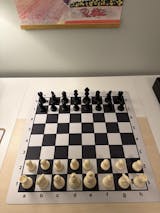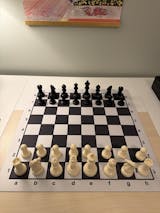Why Play Chess?
Posted by Shelby Lohrman on
Written by Evan Rabin

In May, I kicked off a Premier Chess Program at a middle school at an impoverished neighborhood in Brownsville, New York by asking “Why Play Chess?” I received some typical answers, including “It’s Fun.”, “It helps you think.” and “Competition is fun.” They were shocked how I explained the plastic pieces could help them get into high school, college and a good career. Chess has influenced me to become a critical thinker, conduct enterprise sales at Oracle and Rapid7, cofound a sales outsourcing startup Pillar Sales and ultimately form Premier Chess. Premier Chess teaches life lessons to all ages and levels for organizations ranging from Thistlewaith Early Learning Center to Grace Church School to the law firm Kramer Levin to the nursing home Village Cares. It illustrates the tactical and strategical lessons business leaders could learn through the game. Here are some of the highlights:
“Contextual leadership is …. Transformational in the Opening (Andrew Gove of IBM) …. Situational in the Middlegame (military leaders)…. Results-Based in the Endgame (Bill Gates)”. A good leader has a blend of these qualities. The opening of a chess game is like a brand-new startup that is innovative and changing the marketplace. In the middlegame, one has to evaluate the position given his success or lack thereof in the opening and determine whether he should keep the status quo or go for complications. Good poker players win because they maximize their chances given their hand. While its true that the “fish” will get lucky every now and then, the Phil Ivies and Ylon Schwartzs of the world (the latter is a noted chess player) will win a bulk of the money in the long run. Finally, in the endgame, one has to take his advantage and convert it to a win as a sales rep needs to close a deal.
To demonstrate the importance of transformational leadership, one could compare the first two months of my stints at Oracle and Rapid7. At Oracle, it took me 2 months to get a territory and another to get a manager. To the contrary, at Rapid7, I knew during my interview process that I was going to be on the State, Local and Education team and a few days after I started that I was going to cover the Northeast. Rapid7 used the basic opening principle of “creating an organizational environment with every piece contributing in fewer than twelve moves.”. As the Allman Brothers Band says, “Aint Wastin’ Time no More!” As every move needs to have a purpose, a company should spend too much time with on-boarding. At the end of the day, employees learn the most from their mistakes while on the job.
On the first day of Premier Chess Make a Difference Now trip in Tanzania, four volunteer instructors and I taught how to play the pawn game. As the students didn’t show they knew how the pawn moved perfectly by raising their hands, the instructors wanted to do another sample game using demo board. When I made the executive decision that we would hand out the chess boards, 80% of the students moved the pawn correctly. The rest we taught as they made mistakes. While sales training and role-plays are important, a sales rep truly learns the ropes when he hits the phone for the first time.
Each piece needs to have its own job; one developing move can not hinder the performance of another. Every single move in the opening should be related to developing a piece, controlling the center or castling. My team at Oracle (which covered Infrastructure sales in Eastern Canada) illustrates this concept well as we divided and conquered. Jake and I were the team experts on prospecting. We relied on Mike for operations advise. Herb, who became promoted to our manager, was the expert on legal and pricing conversations. Diane was the “go to” for teaming agreements.
Situational leadership occurs as chess players orchestrate their strategic plans and related tactics. Grandmaster Alexander Kotov says, “It often happens that a player carries out… complicated calculation but fails to spot something elementary right at the first move”. This is exactly why we tell students before making a move, they should also do a blunder check so they do not miss anything that is obvious. Sales people will often get “happy ears” and invest a lot of time into a deal thinking it would definitely come in without doing any basic research. While working for Uncle Larry Ellison, I made this mistake when working a non-existent deal with AGFA, a bio-tech company in Ontario. doing enough research about BANT in the beginning (Budget, Authority, Need and Timeline), I built great rapport with my champion and decided to give them a loaner unit for a month. Towards the end, my engineer a Mahesh and I realized he was spinning our wheels and used our engineered system for R&D.
In World War II, Stalin and Roosevelt famously allied because they had the common enemy of Hitler’s Nazi Germany. Likewise, “In 1999, Elon Musk’s X.com and Peter Thiel’s Confinity were locked in a heated battle to be the first company to supply eBay with an electronic payment system…. Rather than risk the possibility of losing it all, it’s perfectly acceptable in chess to offer your opponent a draw.” Rather than either party winning the race, Musk and Thiel decided to merge their companies.
Oracle’s sales reps face a lot of internal competition. In addition to competing with IBM, Dell, HP, Cisco, etc., Oracle server reps have to compete with other lines of business including the storage team, cloud team, etc. One of the biggest deals I closed at Oracle was with 407' ETR, a privately-owned highway, which connects Ontario and Quebec. The client expressed interest in one of Oracle’s flagship products, the Oracle Database Appliance, which has an option for additional storage capacity, and ZFS storage, which was sold by another team. Many of my colleagues thought I should operate in my own swim-lane so I would get a bigger deal size but in the end working closely with the storage rep proved to be valuable as we closed a deal for $600,000 CAD in servers and $400,000 CAD in software.
“Strategy is all ways there; it’s the tactics that come and go.” In chess, it is not only important to understand the array of tactical motifs but it’s important to intuitively feel positions and see when tactics are in the air. Likewise, most professionals need to be able to develop a strong intuition and judgement skills. A sales person needs to know how to respond to surprises on the phone. A lawyer needs to know how to respond to a judge in a trial. A managerial accountant needs to give quick advice on decisions like build vs. buy. Similarly, in a chess game, the player needs to decide whether he is going to develop his pieces normally or “buy” a lead in development by gambiting a pawn or two. Kevin McGee, a Senior Vice President at Oracle once told my team “You are usually not going to get a customer to buy something when he doesn’t need it but you could get creative and escalate timeline”. I started trying methods like reverse time lining and developing interesting price structures.
“In business and in chess, you can beat your competition if you know your landscape better than your opponent.” Both business and chess requires a combination of analyzing historical data and developing your own ideas on the board. When I was at Rapid7, one of the action items was looking at current and lost business opportunities in the pipeline. There was one opportunity with a gentleman who manages IT for Onanandoga County, New York. My colleague who previously managed the account, wrote that the guy was waste of a time with no budget; he confirmed this in person. I took what he said with a grain of salt and reached out to the prospect. A few months later I closed a deal with him after he received Cyber Security grant from New York State. It goes to show that while preparation is key, you need to do some work on your own at the board!
When students play openings and endgames they’ve already learned before, they will often rush. While in Tanzania last week, I taught the class the Ladder Mate (King and two rook checkmate) and explained how in order to force the king to edge of the board, students need to move rooks like two feet while walking, taking turns. I then moved my king to attack rook, testing to see if class would notice that they would have to swing rook to other edge of other board, rather than proceeding with original plan by alternating rooks. As expected, the girl who raised her hand alternated rooks and blundered one of them away, making her job a lot harder.
In chess, business and law, one must perform judgement, “the process of evaluating a threat.” When doing so, one could “underestimate the threat” …nail the threat… [or] overestimate the threat”. It is important for chess players, business owners and lawyers to analyze threats and determine how critical they are. Some will overlook a threat in the first place, especially when they have a great position and feel invincible. Most blunders in chess happen when a player has a better position and gets overconfident. Toys R’ Us underestimated the threat of Amazon and shockingly recently announced its down fall. Whoever would have thought the 100+ year old empire would fall? It rested on its laurels and failed to innovate.
Chess players will often overestimate threats and either resign or give away free pieces when they fail to maintain stamina and look for saving moves. For instance, often when a beginner get into check early on in the game, he will instantly move his king to run away and get into a much worse position. In reality, he should find a way to block check and maintain the right to castle to have a safe king.
The lessons that Chess provides regarding leadership, division of labor, short and long-term strategy, judgement and more has already greatly affected the way we teach students, ranging from pre-school to senior citizen. We teach not only tactics and strategies but also the lessons chess could bring to other walks of their lives. For instance, we tell our K-12 students that chess could help in various subjects and help them get into college. One of our students at the Royal School in Tanzania said “Chess has helped me think in mathematics because… in mathematics, you need to find the answer for problems like in chess when you need to solve the problem. If you're in check, you need to [figure out how] to get out of check.” We teach lawyers at Kramer Levin how chess will help them with judgement and think impromptu during cases. We tell our students at Village Care how the game will help with memory retention.
Upper West Side Camp, July 30-August 3:
http://premierchess.com/premier-chess-camp-at-zplay-july-9-13-and-july-31-aug-3/
Email premierchess64@gmail.com or call (917)776-1306 if you have any questions.


